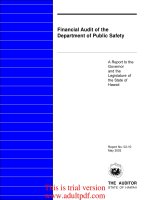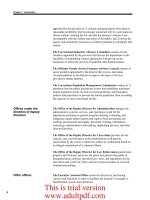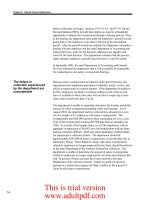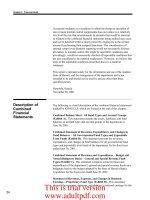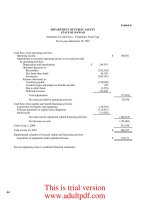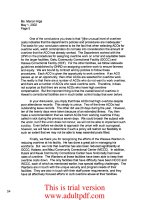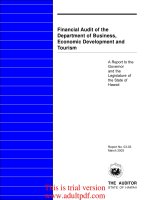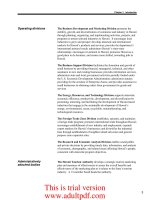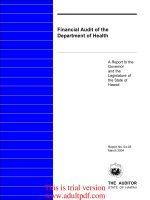Financial Audit of the Department of the Attorney General_part1 pot
Bạn đang xem bản rút gọn của tài liệu. Xem và tải ngay bản đầy đủ của tài liệu tại đây (54.39 KB, 11 trang )
Financial Audit of the
Department of the Attorney
General
A Report to the
Governor
and the
Legislature of
the State of
Hawai`i
THE AUDITOR
STATE OF HAWAI`I
Report No. 04-05
May 2005
This is trial version
www.adultpdf.com
Office of the Auditor
The missions of the Office of the Auditor are assigned by the Hawai`i State Constitution
(Article VII, Section 10). The primary mission is to conduct post audits of the transactions,
accounts, programs, and performance of public agencies. A supplemental mission is to
conduct such other investigations and prepare such additional reports as may be directed by
the Legislature.
Under its assigned missions, the office conducts the following types of examinations:
1. Financial audits attest to the fairness of the financial statements of agencies. They
examine the adequacy of the financial records and accounting and internal controls, and
they determine the legality and propriety of expenditures.
2. Management audits, which are also referred to as performance audits, examine the
effectiveness of programs or the efficiency of agencies or both. These audits are also
called program audits, when they focus on whether programs are attaining the objectives
and results expected of them, and operations audits, when they examine how well
agencies are organized and managed and how efficiently they acquire and utilize
resources.
3. Sunset evaluations evaluate new professional and occupational licensing programs to
determine whether the programs should be terminated, continued, or modified. These
evaluations are conducted in accordance with criteria established by statute.
4. Sunrise analyses are similar to sunset evaluations, but they apply to proposed rather than
existing regulatory programs. Before a new professional and occupational licensing
program can be enacted, the statutes require that the measure be analyzed by the Office
of the Auditor as to its probable effects.
5. Health insurance analyses examine bills that propose to mandate certain health
insurance benefits. Such bills cannot be enacted unless they are referred to the Office of
the Auditor for an assessment of the social and financial impact of the proposed
measure.
6. Analyses of proposed special funds and existing trust and revolving funds determine if
proposals to establish these funds are existing funds meet legislative criteria.
7. Procurement compliance audits and other procurement-related monitoring assist the
Legislature in overseeing government procurement practices.
8. Fiscal accountability reports analyze expenditures by the state Department of Education
in various areas.
9. Special studies respond to requests from both houses of the Legislature. The studies
usually address specific problems for which the Legislature is seeking solutions.
Hawai`i’s laws provide the Auditor with broad powers to examine all books, records, files,
papers, and documents and all financial affairs of every agency. The Auditor also has the
authority to summon persons to produce records and to question persons under oath.
However, the Office of the Auditor exercises no control function, and its authority is limited to
reviewing, evaluating, and reporting on its findings and recommendations to the Legislature and
the Governor.
THE AUDITOR
STATE OF HAWAI`I
Kekuanao`a Building
465 S. King Street, Room 500
Honolulu, Hawai`i 96813
This is trial version
www.adultpdf.com
The Auditor State of Hawai`i
OVERVIEW
Financial Audit of the Department of the Attorney General
Report No. 05-04, May 2005
Summary
The Office of the Auditor and the certified public accounting firm of
PricewaterhouseCoopers LLP conducted a financial audit of the Department of the
Attorney General, State of Hawai‘i, for the fiscal year July 1, 2003 to June 30,
2004. The audit examined the financial records and transactions of the department;
reviewed the related systems of accounting and internal controls; and tested
transactions, systems, and procedures for compliance with laws and regulations.
In the opinion of the firm, the financial statements present fairly, in all material
respects, the department’s financial position and changes in its financial position
for the fiscal year ended June 30, 2004, in conformity with generally accepted
accounting principles. However, the firm was unable to apply auditing procedures
to satisfy itself regarding the amounts reported as due to and held for Child Support
Enforcement Agency recipients in the agency funds in the statement of fiduciary
net assets and therefore, the scope of the firm’s work was not sufficient to enable
it to express an opinion on the aggregate remaining fund information of the
department.
With respect to the department’s internal control over financial reporting and
operations, we found several deficiencies, including a significant reportable
condition considered to be a material weakness. In the material weakness, we
found that the department has never reconciled its Child Support Enforcement
Agency bank account to the child support subsidiary records. Therefore, the
department cannot accurately determine the amount that should be reflected as
“due to and held for agency recipients.”
We also found that the department’s poor procurement practices resulted in
noncompliance with certain provisions of the Hawai‘i Public Procurement Code.
Our testing of the department’s procurement practices revealed that small purchase
forms were not properly utilized; vendor quotations were not obtained for small
purchases; competitive sealed proposal selections were not properly documented;
bid opening procedures were not followed; and performance bond requirements
were not met. As a result, there was no assurance that fair competition was sought
by the department and that state funds were spent in an effective and cost-
beneficial manner.
Finally, we found that the department’s reporting process is inefficient. Compiled
financial statements for the year ending June 30, 2004, were not available until
February 23, 2005, nearly eight months after the fiscal year-end. Additionally,
three out of 40 federal categorical assistance progress reports were not filed by
their respective due dates.
This is trial version
www.adultpdf.com
Report No. 05-04 May 2005
Marion M. Higa Office of the Auditor
State Auditor 465 South King Street, Room 500
State of Hawai`i Honolulu, Hawai`i 96813
(808) 587-0800
FAX (808) 587-0830
We recommend that the department maintain accurate and complete child support
subsidiary records and ensure that the balances reconcile to the related bank
accounts.
We also recommend that the department ensure compliance with the Hawai‘i
Public Procurement Code by 1) providing procurement training to all responsible
personnel, 2) requiring division heads to ensure responsible personnel have copies
of current procurement guidance, and 3) ensuring all required procurement forms
and procedures are completed and complied with.
We also recommend that the department develop procedures that ensure timely
year-end financial reporting. Finally, the department should establish and enforce
formal written procedures to delineate responsibilities and deadlines for federal
financial report completion and submission.
In its written response, the department disagrees with several of our findings and
recommendations. The department disagrees with the merit and severity of our
finding involving the failure to reconcile child support cash accounts and subsidiary
records. In support of its stance, the department details its child support cash
reconciliation procedures, while simultaneously admitting that some of the
reconciling items will never be completely resolved. The department further states
that we failed to consider reconciliations of and between subsidiary ledgers
extracted from the automated child support system and the child support bank
account, none of which support the focus of our finding—the child support
benefits liability reported as “due to and held for agency recipients.” The
department concludes that since the problem was created so long ago (1987), it
cannot be severe enough to warrant a “material weakness” and should at least be
downgraded to a “reportable condition.”
The department also objects to two separate procurement findings; however,
evidence cited to support its claims was not found in the respective procurement
files and was not mentioned by department personnel at the time of our testwork.
Recommendations
and Response
This is trial version
www.adultpdf.com
Financial Audit of the
Department of the Attorney
General
Report No. 05-04
May 2005
A Report to the
Governor
and the
Legislature of
the State of
Hawai`i
Conducted by
The Auditor
State of Hawai`i
and
PricewaterhouseCoopers
LLP
THE AUDITOR
STATE OF HAWAI`I
Submitted by
This is trial version
www.adultpdf.com
Foreword
This is a report of the financial audit of the Department of the Attorney
General, State of Hawai‘i, for the fiscal year July 1, 2003 to June 30,
2004. The audit was conducted pursuant to Section 23-4, Hawai‘i
Revised Statutes, which requires the State Auditor to conduct postaudits
of all departments, offices, and agencies of the State and its political
subdivisions. The audit was conducted by the Office of the Auditor and
the certified public accounting firm of PricewaterhouseCoopers LLP.
We wish to express our appreciation for the cooperation and assistance
extended by the officials and staff of the Department of the Attorney
General.
Marion M. Higa
State Auditor
This is trial version
www.adultpdf.com
v
Table of Contents
Chapter 1 Introduction
Background 1
Organization 1
Objectives of the Audit 4
Scope and Methodology 6
Chapter 2 Internal Control Deficiencies
Summary of Finding 7
The Department Does Not Reconcile the CSEA Bank
Account to Child Support Subsidiary Records 8
Recommendation 10
The Department’s Poor Procurement Practices
Resulted in Noncompliance 10
Recommendations 14
Financial Reports Are Untimely 15
Recommendation 16
Chapter 3 Financial Audit
Summary of Findings 17
Independent Auditors’ Report 17
Report of Independent Auditors on Internal Control
Over Financial Reporting and on Compliance and
Other Matters Based on an Audit of Financial
Statements Performed in Accordance with
Government Auditing Standards 20
Description of Basic Financial Statements 22
Notes to Basic Financial Statements 23
Response of the Affected Agency 45
List of Exhibits
Exhibit 1.1 State of Hawaii, Department of the Attorney General,
Organizational Chart 5
Exhibit 3.1 Department of the Attorney General, State of Hawaii,
This is trial version
www.adultpdf.com
vi
Statement of Net Assets, June 30, 2004 37
Exhibit 3.2 Department of the Attorney General, State of Hawaii,
Statement of Activities, Year Ended
June 30, 2004 38
Exhibit 3.3 Department of the Attorney General, State of Hawaii,
Balance Sheet, Governmental Funds,
June 30, 2004 39
Exhibit 3.4 Department of the Attorney General, State of Hawaii,
Statement of Revenues, Expenditures, and
Changes in Fund Balances, Year Ended
June 30, 2004 41
Exhibit 3.5 Department of the Attorney General, State of Hawaii,
Governmental Funds, Reconciliation of the
Statement of Revenues, Expenditures, and
Changes in Fund Balances to the Statement of
Activities, Year Ended June 30, 2004 42
Exhibit 3.6 Department of the Attorney General, State of Hawaii,
Budgetary Comparison Statement, Year Ended
June 30, 2004 43
Exhibit 3.7 Department of the Attorney General, State of Hawaii,
Statement of Fiduciary Net Assets, Net Funds,
June 30, 2004 44
This is trial version
www.adultpdf.com
1
Chapter 1: Introduction
Chapter 1
Introduction
This is a report of our financial audit of the Department of the Attorney
General, State of Hawai`i. The audit was conducted by the Office of the
Auditor and the independent certified public accounting firm of
PricewaterhouseCoopers LLP. The audit was conducted pursuant to
Section 23-4, Hawai`i Revised Statutes (HRS), which requires the State
Auditor to conduct postaudits of the transactions, accounts, programs,
and performance of all departments, offices, and agencies of the State of
Hawai`i and its political subdivisions.
The Department of the Attorney General is part of the executive branch
of the State of Hawai`i. The department administers and renders legal
services, including furnishing written legal opinions to the governor,
Legislature, and such state departments and offices as the governor may
direct; represents the State in all civil actions in which the State is a
party; approves as to legality and form all documents relating to the
State’s acquisition of any land or interest in land; and unless otherwise
provided by law, prosecutes cases involving agreements, uniform laws,
or other matters that are enforceable in the courts of the State.
The department is headed by the attorney general. The Office of the
Attorney General directs and coordinates the various activities of the
department within the scope of laws, rules, and established policies.
Exhibit 1.1 displays the department’s organizational structure. The
primary responsibilities of these units follow:
This central office provides management, accounting, data processing,
and other administrative services for the department.
The Administration Division provides legal services to the Judiciary,
the Office of the Governor, the Office of the Lieutenant Governor, the
Department of Accounting and General Services, and the Department of
Budget and Finance.
The Civil Recoveries Division systematically recovers and collects
moneys ranging from accounts receivable, dishonored checks, delinquent
loans, salary and benefit overpayments, complex delinquent child
Background
Organization
Legal services
Administrative
Services Office
This is trial version
www.adultpdf.com
2
Chapter 1: Introduction
support cases, unpaid traffic fines, civil judgments, delinquent patient
accounts, property damage claims, lease rents, construction litigation,
contract disputes, and miscellaneous fees owed to the State and its
agencies. In addition, it represents the State in major contract or
construction disputes.
The Civil Rights Litigation Division provides legal defense to the State,
its department/agencies, and certain state employees’ in lawsuits or other
claims that involve allegations of constitutional/civil rights violations.
The Commerce and Economic Development Division provides legal
services to the Department of Business, Economic Development, and
Tourism and the Department of Commerce and Consumer Affairs. The
antitrust section is responsible for mediating, investigating, and
prosecuting antitrust law violations.
The Criminal Justice Division reviews and prosecutes, if appropriate,
cases referred to the department for criminal actions involving a state
official or agency, or criminal cases with statewide impact. The division
also provides assistance to the Office of the Prosecuting Attorney in each
county, coordinates investigations and prosecutions of crimes occurring
in more than one county, and develops special prosecution units to
investigate and prosecute selected crimes.
The Education Division provides legal services to the Board of
Education, state educational institutions, the Department of Education,
and the Department of Health as it relates to Felix consent decree
matters, the Office of Elections, the Judiciary, as well as the Legislature.
The Employment Law Division is responsible for advising, counseling,
and representing the State in all matters arising out of its activities as an
employer.
The Family Law Division provides representation at Family Court for
the Department of Human Services in child abuse and neglect cases and
provides legal services to other state agencies.
The Health and Human Services Division furnishes legal services to
the Department of Health and the Department of Human Services, except
for Family Court matters.
The Labor Division assists the Department of Labor and Industrial
Relations in the interpretation of state statutes and their application to
factual situations, many of which arise in the context of decision-making
under programs such as workers’ compensation, unemployment
insurance, occupational safety and health, wage and hour, and fair
employment practices. It also advises the Department of Labor and
This is trial version
www.adultpdf.com
3
Chapter 1: Introduction
Industrial Relations with regard to the interpretation of federal statutes
and federal common law.
The Land/Transportation Division provides legal services on all
matters relating to the Department of Land and Natural Resources and
the Department of Transportation, including the preparation of deeds,
leases, easements, grants, and litigation-related documents for cases
involving injunctions, condemnations, and quiet title handled by the
Litigation Division.
The Legislative Division provides legal services on all matters
pertaining to legislation and to administrative rules to be adopted
pursuant to valid delegations of legislative authority.
The Medicaid Investigations Division is responsible for planning,
supervising, and coordinating the investigations of provider fraud and
abuse in the Medicaid program.
The Public Safety, Hawaiian Homelands, and Housing Division
provides legal services to the Department of Public Safety (except for
civil litigation matters), the Department of Hawaiian Home Lands, and
the Hawai`i Community Development Corporation of Hawai`i.
The Special Assignment Division provides legal services on any special
assignment as determined by the attorney general or the special assistant
to the attorney general.
The Tax Division provides legal representation and advice to the
Department of Taxation and other state departments and agencies
primarily in the areas of tax litigation, legislation, rules, investigations,
and opinions and advice. The division also contains a bankruptcy unit
devoted to handling all bankruptcy cases for the Departments of
Taxation and Human Services. The division also represents the Attorney
General in the oversight and enforcement of charitable trusts.
The Tort Litigation Division provides legal defense to personal injury
lawsuits/claims made against the State and/or its departments and
agencies.
The Child Support Enforcement Agency formulates and implements
the state child support enforcement plan as required under Title IV-D of
the Social Security Act and administers Chapter 576D, HRS, in
accordance with Title IV-D and applicable state laws.
The Crime Prevention and Justice Assistance Division serves as a
central agency for the maintenance of information regarding financial
Other divisions
This is trial version
www.adultpdf.com
